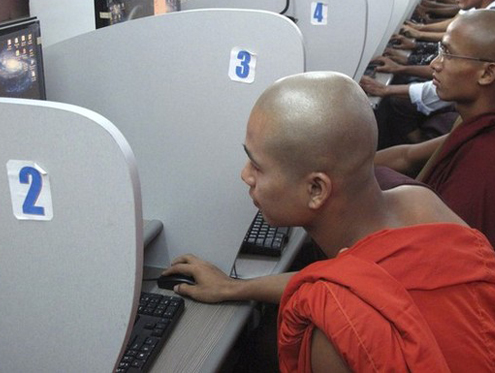Burmese households and businesses face new financial pressures after being saddled with higher electricity costs.
In March, President Thein Sein’s office introduced an energy-pricing scheme to parliament, which raised the cost of energy for consumers. The package was passed in April, eliminating a 25 kyat (US$0.02) per unit ceiling price for electricity.
The new scheme staggers household and industrial pricing of energy. Usage up to 100 units is now charged at 35 kyat per unit, and 40 kyat per unit for up to 200 units used. Usage over 200 units now incurs a cost of 50 kyat per unit.
Kyaw Lin Myint, a Rangoon construction worker, said it has been hard to stretch his monthly salary out to cover the electricity price hike.
“It hurts, my salary is not much and it has been hard to pay all the household bills now that electricity is more expensive,” he said. “It is difficult for us to pay our rent now. There are many poor people like me in the country and I don’t see the price increase as fair.”
Businesses small and large are also reportedly suffering.
Reh Kyaw Thiha, operator of a Rangoon internet cafe said that they have not been able to pass on the costs to their customers and have seen profits dwindle as a result. “Income for the shop reduced compared with previous months,” Reh Kyaw Thiha said.
“Our electricity bill was about 200,000 (US$200) kyats last month. The shops entire turnover is only 900,000 kyats, so it is very difficult for us.”
Win Myint of the Myanmar [Burma] Plastic Industries Association is counting the cost to big business.
“Production costs for members of our association have tripled in the last month, he said. This is the first month, if we don’t find a way to cushion this, then factories may begin to close.”
“Businesses now have to weigh the market to increase the costs of their products. They’ll also have to reduce the usage of electricity as well as renovating the supply wires,” he said.
[related]
Despite the pain, the government’s package is a good deal softer than a previously proposed pricing structure. An initial proposal by the Ministry for Electricity drew intense criticism from consumers — the 50 kyat (US$ 0.05) unit price for all households using more than 100 units seen as unfair. Last November, demonstrators took to the streets of Rangoon in a candlelight vigil to protest that proposal.
However the Ministry of Electricity has remained opposed to the reworked costings scheme launched in April, which they see as too generous. The ministry has advised parliament that the government stands to incur the cost of a 770 million kyat per year shortfall despite the revised pricing scheme.



